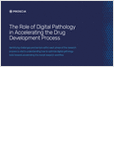 | Digital pathology is transforming life science research and drug development. However, to achieve the potential benefits, organizations must identify and address key barriers and challenges in each phase of the research process.
This white paper provides an overview of the many challenges inherent within each of these phases, and explores how digital pathology can address these challenges to accelerate the speed and overall success of the drug development process. About Proscia: Proscia’s mission is to transform cancer research and diagnosis with intelligent software that changes the way the world practices pathology, building tools that are redefining pathology and giving pathologists better ways to fight diseases such as cancer today. Request Free! |
